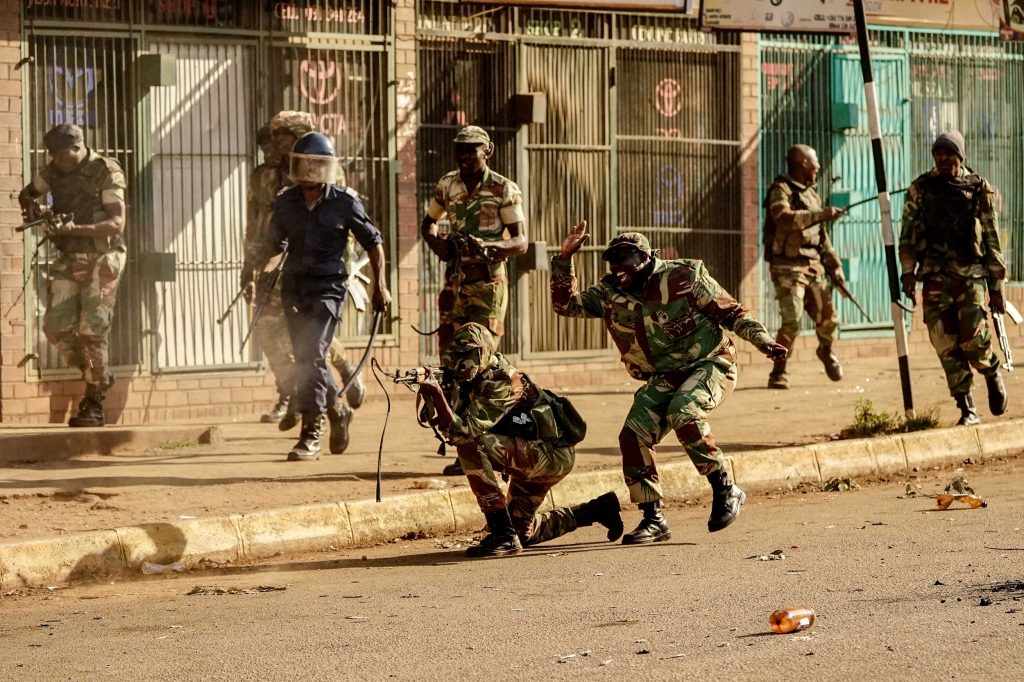
A soldier fires shots towards demonstrators in Zimbabwe on August 1 2018, as protests erupted over alleged fraud in the country’s election. PHOTO | ZINYANGE AUNTONY | AFP
Today marks the fourth year since seven people tragically lost their lives while 35 others were injured in the wake of the 2018 post-election violence. In 2018, Zimbabwe held its first election post the Mugabe era. The government which took over following the November 2017 coup touted itself as a new dispensation.
Many hoped that the election would mark the beginning of a new chapter in Zimbabwe’s history where elections would not be synonymous with violence. However, leading up to the elections, the National Transitional Justice Working Group (NTJWG) warned of impending violence and called for action to curb it. Regrettably, these calls were ignored, and on 1 August 2018 protests erupted in Harare following delays in the release of the results of the presidential election. The police assisted by the army were deployed to quell the violence and they proceeded to use live ammunition on protesters as well as unarmed bystanders resulting in deaths, injuries, and property damage.
Following this tragedy, President Emmerson Mnangagwa appointed a Commission of Inquiry led by former South African President, Kgalema Motlanthe, to investigate what transpired and make recommendations to ensure non-recurrence. Among the findings of the Motlanthe Commission was the finding that the deaths and injuries that occurred were attributable to the military and the police. The Motlanthe Commission made various recommendations including the payment of compensation, the need for electoral reforms, accountability in respect of the alleged perpetrators, enforcement of law and order to ensure non-recurrence, national healing, and reconciliation. Although the Government of Zimbabwe (GoZ) has claimed otherwise, to date these recommendations have not been fully implemented as efforts have been made to implement only two recommendations.
Firstly, an inter-ministerial committee was set up in 2019 to implement the recommendation relating to the payment of compensation, but the compensation fund has not been established. Secondly, concerning the recommendation to have a multi-party reconciliation initiative to address the root causes of the post-election violence the President established a Political Actors Dialogue (POLAD) as a forum for leaders across the political spectrum to meet and discuss issues of common interest. However, as the NTJWG has previously highlighted and reiterates today, the POLAD platform is not all-encompassing and has been shunned by some political actors which limit its effectiveness to bring sustainable change. Furthermore, the POLAD platform is exclusive to political actors and does not include other stakeholders.
Today the NTJWG remembers those that lost their lives on 1 August 2018 and calls on the GoZ to honour them by holding those responsible for their deaths accountable and compensating their families. Furthermore, the NTJWG stands in solidarity with those who were injured and implores the GoZ to provide them with any support they may need to fully recover. In remembrance of the tragedy that befell the nation on 1 August 2018, the NTJWG also reflects on the fast-approaching 2023 elections. The current political climate in Zimbabwe is tense. The nation is on the brink of violent eruptions, and there is an urgent need for all Zimbabweans to work together to prevent a recurrence of the events of 2018.
The NTJWG acknowledges the recent efforts of the National Peace and Reconciliation Commission (NPRC) to bring together political actors through the POLAD forum ahead of the elections. While political actors play a crucial role in ensuring peaceful elections, this role must not be overstated to the detriment of engagement with other actors, including Zimbabwe’s citizens. To that end, the NTJWG calls for the following:
- The NPRC must resume the inclusive national dialogue process it started in 2019 where everyone has a seat at the table and seats are not reserved for political actors alone;
- The NPRC must work with the police, the Zimbabwe Human Rights Commission and the National Prosecuting Authority to investigate and prosecute perpetrators of violence in the current pre-election period as a precursor to the 2023 elections;
- The GoZ must take steps to ensure the full implementation of all the Motlanthe Commission recommendations;
- The Zimbabwe Electoral Commission must ensure that it implements electoral reforms in consultation with political actors, civil society, and the citizenry to create an environment that is conducive to holding free and fair elections in 2023;
- All political leaders must be proactive in promoting peace and ensuring zero tolerance for the violence perpetrated by their supporters; and
- All Zimbabwean citizens must take an active interest in promoting peace and shun violence in their communities regardless of differing political affiliations and views.


